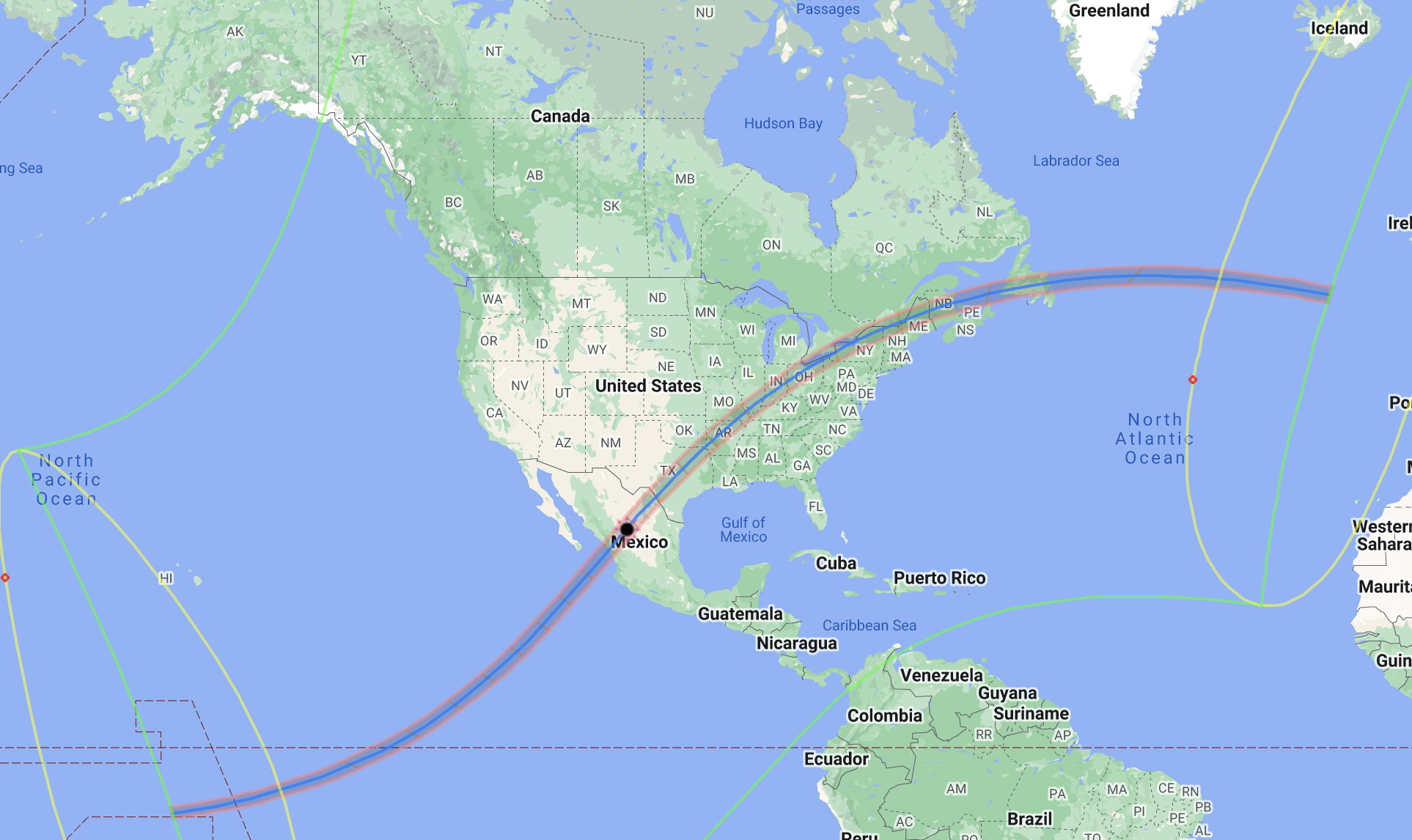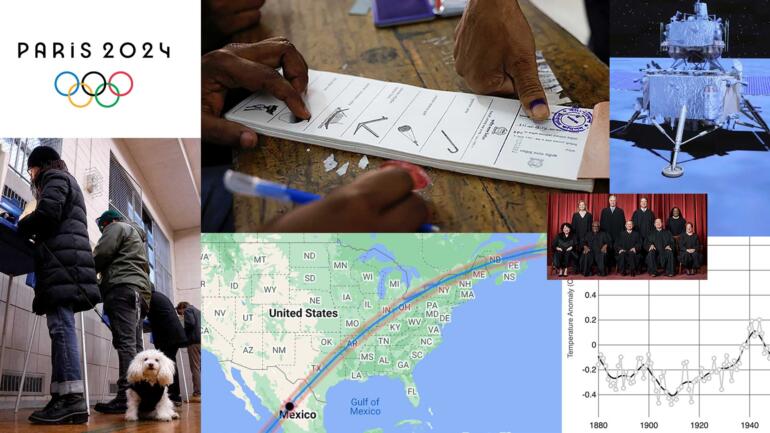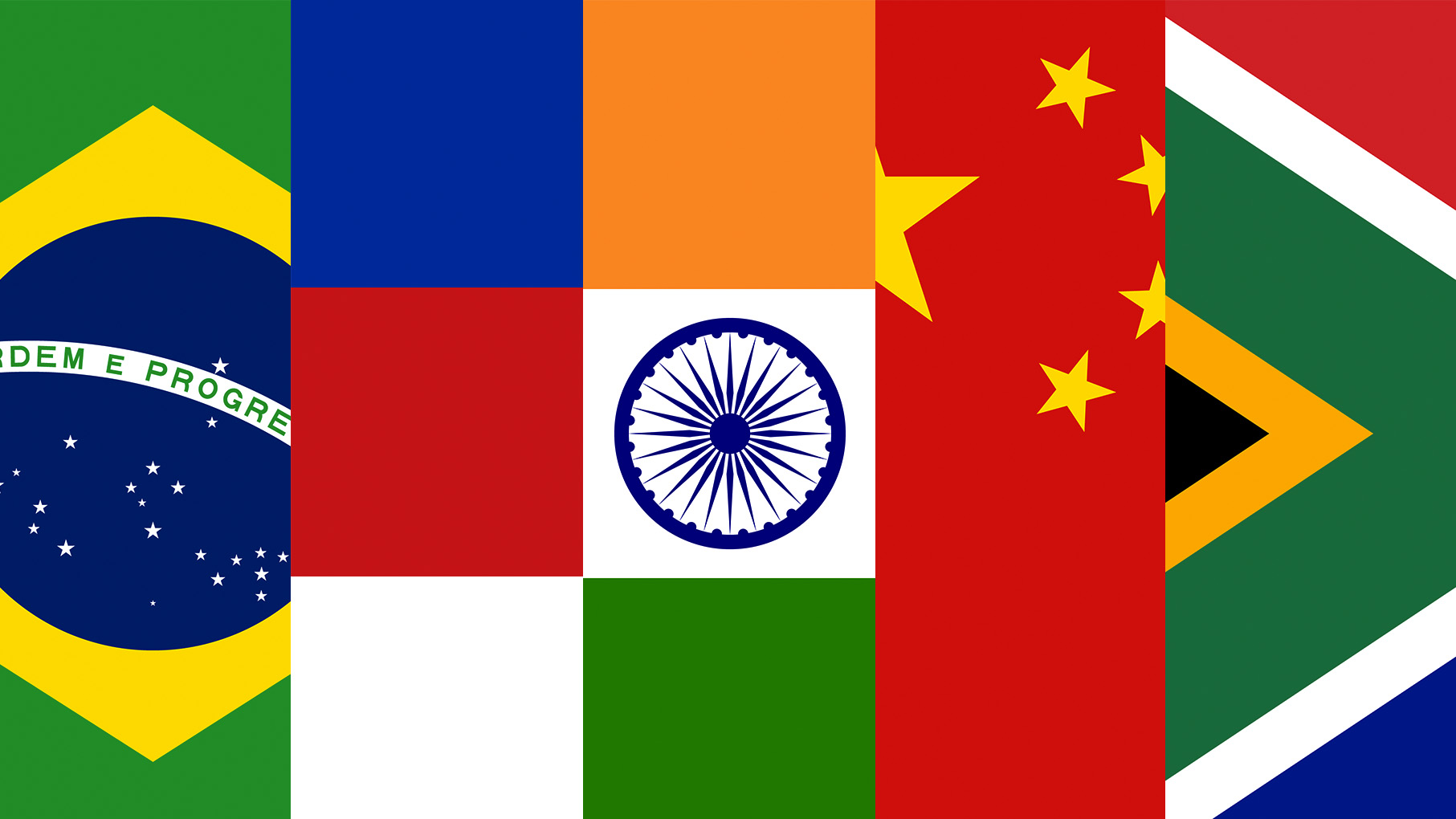While much of of 2024 is still unknown, many events that will occur this year have long been in the works. For instance, 2024 will be the biggest election year in history, with 4 billion people headed to the polls in more than 60 nations. Here’s a look at what to expect around the world in 2024.
Jan. 20: Japan on moon
Japan’s Smart Lander for Investigating Moon, or SLIM, is expected arrive on the moon after it launched in Sept. 2023. If successful, it will mark the first time Japan has landed a spacecraft on the moon, making it only the fifth nation after Russia, the U.S., China, and India to do so.
Jan. 30-31: Interest rate cut?
The U.S. Federal Reserve Board will meet for the first time in 2024. It has so far penciled in three interest rate cuts for 2024. The remaining meetings will take place on March 19-20, April 30-May 1, June 11-12, July 30-31, Sept. 17-18, Nov. 6-7, and Dec. 17-18.
Feb. 8: Pakistan votes
Pakistan’s election commission announced a general election on Feb. 8, but it’s unclear if it will actually happen. On Jan. 5, the Senate passed a non-binding resolution that demanded an election delay, citing security concerns. Nomination papers for jailed former Prime Minister and leader of the opposition party Imran Khan has also been rejected by the election commission.
Feb. 14: Indonesia votes
The largest single-day direct presidential election will be held in Indonesia, with 200 million expected at the polls. Popular current President Joko Widodo’s will end his second five-year term on Oct. 20, and he cannot run again due to term limits. Among the candidates are Defense Minister Prabowo Subianto, former Central Java Governor Ganjar Pranowo and former Jakarta Governor Anies Baswedan. If none of the candidates score a majority vote, a runoff could take place in June.
Feb. 27: Israel votes
Israel will hold city and local council elections, already delayed from the original date of Oct. 31, 2023. It will be the first elections held in Israel since the Oct. 7 terrorist attack by Hamas and the subsequent Israeli bombardment of Gaza. At least 688 Israeli Defense Services reservists are running for seats.
Feb. 29: Leap Day
2024 is a leap year, meaning the world will mark Feb. 29 for the first time since 2020. The extra day that comes every four years allows the calendar to sync up with the seasons. The Earth takes about 365.24 days to go around the sun, but most calendars only have 365 days. The extra .24 days is accounted for with the leap year, otherwise the start of the seasons would get increasingly off each year. This is good for farmers and almost everyone else, except maybe those born on Feb. 29. But even with the addition of leap years, the calendar still isn’t perfectly aligned with the Earth’s solar orbit. To make it even more accurate, every 400 years, three leap days need to be eliminated. So there was no leap day in 1700, 1800, and 1900, but there was one in 2000, and there won’t be one in 2100.
March 15-17: Russia votes
Russians vote for president in a three-day election with incumbent Vladimir Putin running for his fifth term. The winner will be inaugurated in May.
March: Iran votes
Iran will hold parliamentary elections in March, the first since the anti-compulsory-hijab protests that arose following the death of Mahsa Amino in 2022. There are 290 open seats for four-year terms and 88 elected seats on the nation’s Assembly of Experts.
March: Arab League Summit
Bahrain will host the 33rd Arab Summit in Manama likely in March. The last summit saw the return of Syrian President Bashar Al Assad after 12 years of suspension. Israel’s bombardment of Gaza will continue to be a main topic of discussion.
April: South Korea votes
South Korea will hold parliamentary elections that could serve as a referendum on President Yoon Suk Yeol who has not been able to pass legislation due to the opposition party’s majority in the National Assembly.
April-May: India votes
India will hold general elections over several weeks for 543 seats in the Lok Sabha, the lower house of India’s Parliament. With more than 1 million polling stations for 950 million registered voters, the election is the largest in the world. Prime Minister Narendra Modi’s ruling Bharatiya Kanata Party is hoping to win a third five-year term.
April 8: Total solar eclipse
A total solar eclipse dubbed the “Great American Eclipse” will take place. The moon’s shadow as it passes between Earth and the Sun is known as the path of totality – and is the best places to skygaze for the eclipse. It will begin to be seen in the Pacific Ocean, crossing land in Mazatlan, Mexico around 10:51 a.m. local time and travel northeast through the U.S., over cities San Antonio, Austin, Dallas, Little Rock, Carbondale, Indianapolis, Cleveland, Buffalo, Rochester, Burlington (VT) and northern Maine. Residents in Toronto, Montreal, Prince Edward Island and Newfoundland, Canada can also witness the eclipse until 6:17 p.m. local time before it stops being seen in the waters in the middle of the North Atlantic Ocean.

2024 Total Solar Eclipse Map by Xavier M. Jubier.
Weeks before April 21: A comet appears
People in the Northern Hemisphere might be able to view Comet Pons-Brooks and its tail a few weeks before April 21. The comet only passes Earth every 71 years. By April 21, it will be harder to see as it will be closest to the Sun. After that, residents in the Southern Hemisphere might be able to spot it before it’s gone.
Mid-May: South Africa votes
South Africa elections are set to take place, with a date that must be within 90 days of the end of the current Parliamentary term. The ruling African National Congress could possibly lose it’s majority of 30 years since Nelson Mandela became president. If so, it must find coalition parties to govern.
May-June: U.S. Supreme Court rules
The U.S. Supreme Court will likely begin releasing rulings on important cases before it recesses for the summer in June or July. Technically the court has until October before the term ends to release opinions. Some of the important decisions they make will include cases on abortion access, bump stocks that allow rifles to fire like machine guns, and the Jan. 6 attack on the Capitol. They could also rule on whether former President Donald Trump is immune from prosecution for his role in Jan. 6, depending on how lower courts rule.
First half of 2024: China gets samples from lunar far side
China plans to launch the Chang’e-6 mission that will for the first time ever collect samples from the far side of the moon that is older and is not visible to Earth. The lander will also carry scientific instruments from France, Italy and the European Space Agency/Sweden. A Pakistani payload will also be on the orbiter.
June 2: Mexico votes
Mexico will hold a general election for six-year-term president, all 500 members in the Chamber of Deputies, and all 128 members of the Senate. Current President Andrés Manuel López Obrador is ineligible for re-election as the Constitution prevents any president from serving more than one term.
June 6-9: EU votes
European Parliamentary elections will take place, involving 400 million voters in 27 countries. Many say the elections will be some of the most contentious ever due to the rise in far-right member states.
June 13-15: G7 meets
Italy will host the 50th Group of 7 Summit in Fasano. Members Canada, France, Germany, Italy, Japan, UK, and US will be joined by representatives from the EU, South Korea, Australia, and India.
July: Hottest day ever?
The hottest temperature ever on Earth will likely be recorded this month, as July is typically the hottest month of the year. 2023 was the hottest year in the last 174 years, and 2024 is on track to break that record.
July 26-Aug. 11: Paris Olympics
The 33rd Summer Olympics opens in Paris. The city has hosted the Summer games twice before in 1900 and 1924. The International Olympic Committee will not allow teams from Russia and Belarus to compete, due to the Russian invasion of Ukraine, but has said that neutral athletes from those countries can participate in individual competitions, but they cannot display their flags or emblems. Meanwhile World Athletics, the international governing body for track and field, cross country running, road running, race walking, mountain running, and ultra running, is continuing to bar all athletes from Russia and Belarus.
Aug. 17: Indonesia begins capital move to Borneo
Indonesia will hold its Independence Day celebration in Nusantara, East Kalimantan on the island of Borneo for the first time. The celebrations are part of President Joko Widodo’s plan to move the capital from Jakarta to Nusantara by 2024. The goal is to distribute economic activity throughout the country. and combat traffic and overpopulation in Jakarta. Some government departments will begin moving to Borneo in 2024 with the ultimate goal of relocating 1.9 million people there. Borneo is divided among three countries: Indonesia, Malaysia and Brunei.
August: Russia hosts BRICS
Russia will host the BRICS (Brazil, Russia, India, China and South Africa) Summit in the city of Kazan. For the first time, the summit will include five new members: Saudi Arabia, United Arab Emirates, Iran, Egypt and Ethiopia. The makeup of BRICS now accounts for 45 percent of the world’s population.
Sept. 10: United Nations General Assembly
The United Nations General Assembly opens the 79th session in New York City with the first day of high-level general debate taking place on Sept. 24.
Oct. 1: China at 75
The People’s Republic of China celebrates the 75th anniversary of its founding. Later in the year, it will also celebrate the 25th anniversary of Macao’s return to China from being a Portuguese colony.
Nov. 5: U.S. votes
The United States will hold a presidential election which will likely be a rematch of 2020. President Joe Biden is running again for the Democrats, while former President Donald Trump is the Republican frontrunner. Trump has faced setbacks as Maine and Colorado have ruled that he cannot be on the ballot, citing the U.S. insurrection clause and Trump’s role in the Jan. 6 Capitol attack. Trump’s team is challenging the rulings. In addition to president and vice president, U.S. voters will also elect all 435 seats in the House of Representatives and 34 seats in the Senate.
Nov. 11-24: COP 29
Azerbaijan will host COP 29, the United Nations Climate Change Conference in Baku with the main issue how to finance the transition away from fossil fuels.
Nov. 18-19: G20 meets
Brazil will for the first time host the Group of 20 leaders’ meeting in Rio de Janeiro. The G20 comprises the world’s largest economies.
November: APEC meets
The Asia-Pacific Economic Cooperation Summit, which represents 21 economies from the Americas to Asia, will be held in Peru.
Dec. 8: Notre-Dame reopens
Paris’s Notre-Dame Cathedral will reopen five years after a devastating fire destroyed the spire and most of the roof. After years of repair, the cathedral will include a fire protection system and be able to accommodate 14 million visitors a year. President Emmanuel Macron has invited Pope Francis to the reopening ceremony.
Dec. 30: Venus mission?
The first-ever private mission to Venus could launch at the very end of 2024 or into 2025. California company Rocket Lab has partnered with the Massachusetts Institute of Technology to send a spacecraft with a small probe on board that will separate and enter the Venusian atmosphere to scan for organic material in the clouds. In 2020, scientists detected phosphine, a byproduct of microbial life on Earth, in Venus’ clouds. Some hypothesize that the planet’s clouds that have Earth-like temperature and pressure could host life.
 CGTN America
CGTN America


